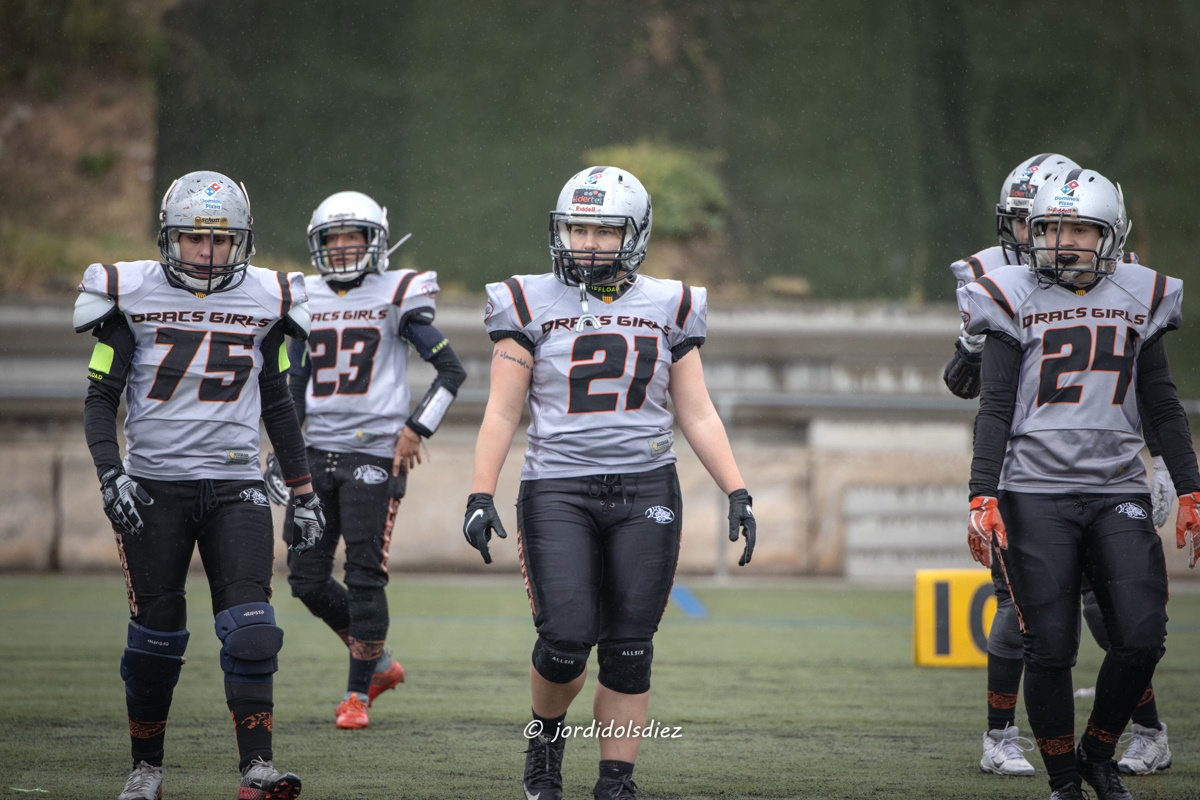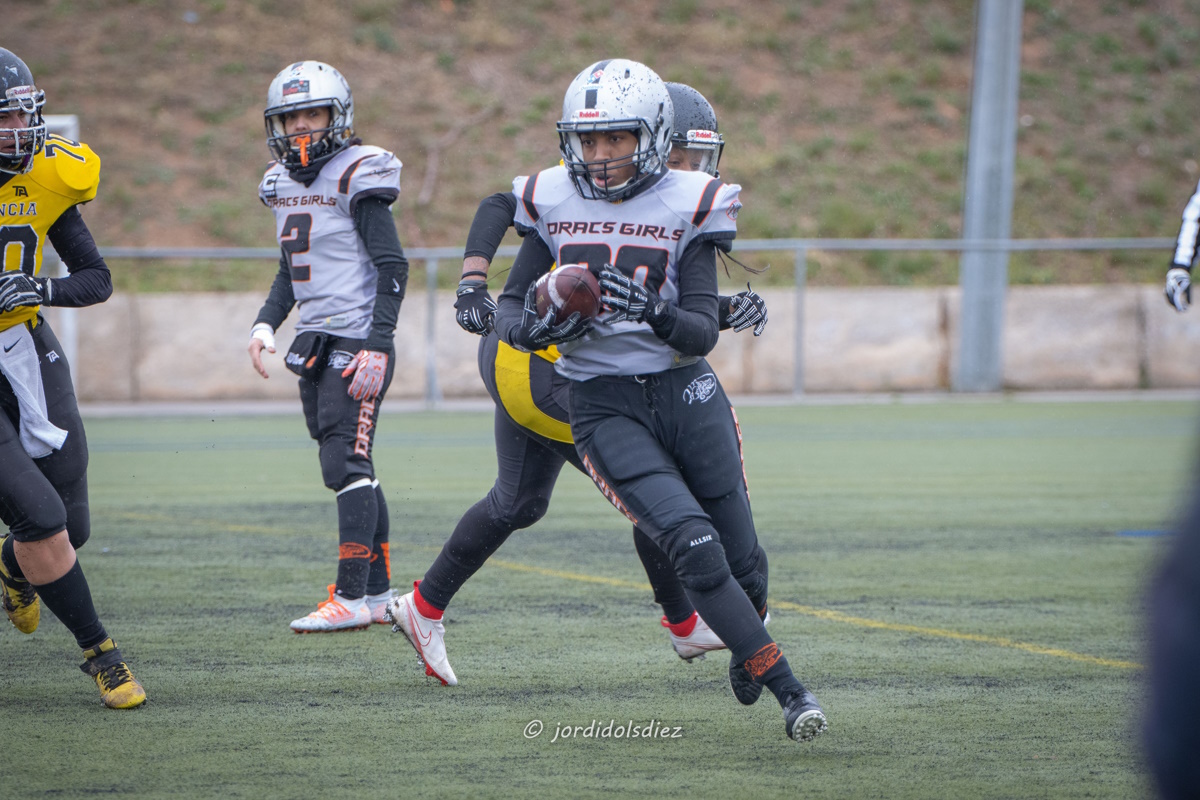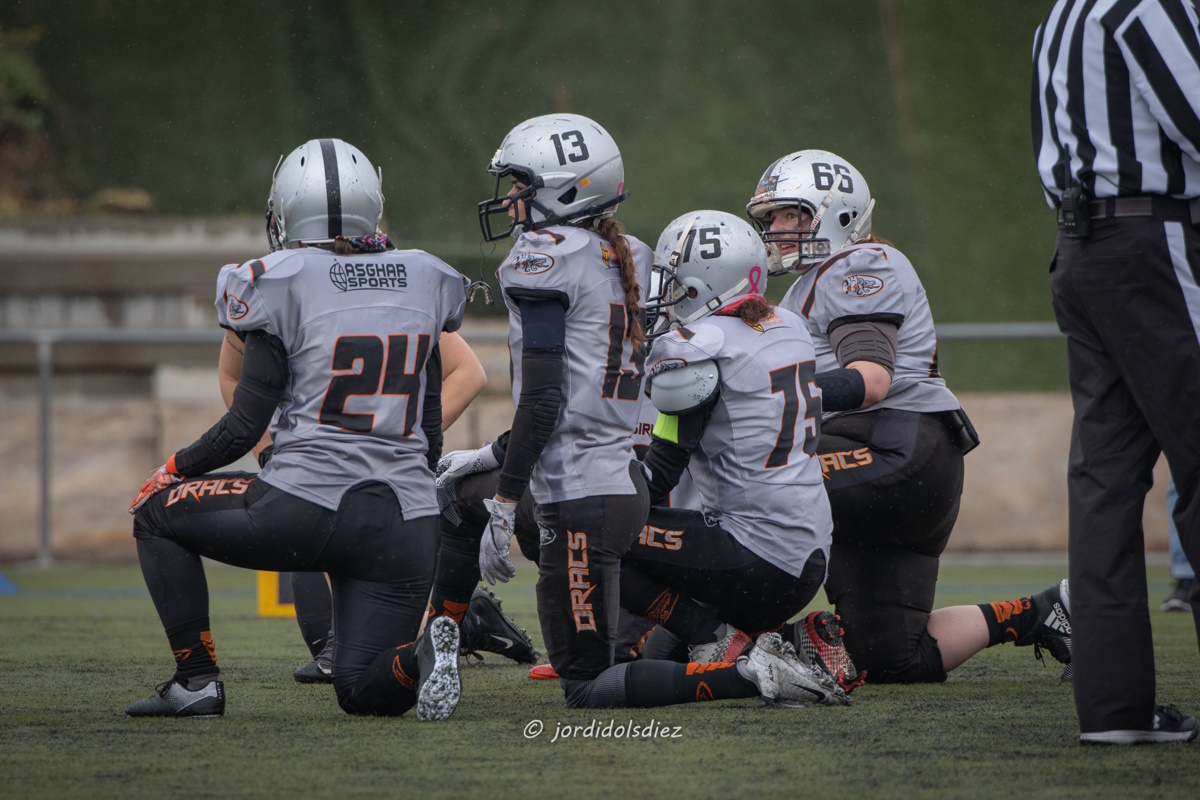Spain: Badalona Dracs Girls exemplify what makes football fun

Every Monday, Wednesday and Friday night, as the Badalona Dracs juniors team finishes up practice, you’ll spot the Dracs’ senior women’s team warming up. Over in one quadrant of the field at Camp Municipal de Montigalà, the several players who show up jog and stretch as they prepare for their own practice.
A senior American football team in the top division of Spain, it has been a difficult season on the field, but a memorable one off it. A winless season that included several blowout defeats, it would be easy to lose momentum and allow the year to slip away. However, if the season was only about on-field results, the team’s corps of players wouldn’t show up several times a week. No, they do so because they love one another’s company and the memories they forge as a team. This year’s team offers a reminder of how American football and sport go beyond the results on the field, no matter how good or how bad they might be.
American football is a lesser-known sport in Spain, although it is growing. It trails fútbol –– or soccer –– basketball and handball in popularity, so it makes sense the team only has 14 players on its roster and games are seven on seven.
“I hope that more girls come out and try the sport, that there will be even more attendance,” quarterback María García said. “We are a group of very few girls and most of the teams in Spain are the same.”
How do American football teams in Spain grow? Programs are trying their best to promote their programs through word of mouth, social media, flyers and Tinder. Yes, Tinder, the popular online dating app.
It turns out that many players first learned about the team thanks to Tinder. Those types of methods are unheard of with many men’s sports, but are not all that uncommon with women’s sports.
“The truth is that there are other (women’s American football teams) also on Tinder,” Pilar ‘Pili’ Romero said. “It’s a way of recruiting players and an idea we had to come up with because we needed more bodies. It has worked really well.”
The Dracs women’s team has existed in its current form for over a decade now –– there were three leagues in the late 1990’s, but they were all eliminated in the early 2000’s. Then, in September 2011, a new league for women’s American football in Spain was formed.
Rubén García has coached the Dracs women’s team since 2018, a role that came about thanks, in part, to his family ties with the Dracs. He played for the club’s men’s senior team himself, María García is his cousin and he has kids currently playing flag football in the club’s academy. One day, a few old teammates still around the organization asked if he would be willing to help coach the women’s team.
“Before I started to coach, I didn’t have any background in women’s American football,” Rubén García said. “Seeing them play made me realize that they have the same enthusiasm, the same desire and the same intensity that any men’s team has.”
García loves to teach players who are completely new to the sport, which is more often than not half the roster in any given year. He enjoys watching their passion grow as they learn more about the game and develop as players.
The first weeks of practice are spent going through the sport’s fundamentals and basics of each different position. It’s during this time that he figures out where different players might fit on the field and where the team’s baseline is.
“We have had so many new girls start playing the sport this year,” García said. “It has been fun seeing the progress they have made. When we first met in December, they didn’t know anything about the sport, absolutely nothing, but since then they have grown.”
The head coach often runs his team through rugby drills to help teach basic fundamentals that both sports share. Eventually, practices evolve into running through concepts as players try out several different positions. One of García’s favorite things to teach new players is tackling.
“Tackling is difficult because it is very hard for the players to do it,” García said. “I know that they are afraid, but I teach them not to worry. The ground is grass, it’s not violent for the sport. It’s very fun because soon the players realize ‘Oh, he’s right.’”
It’s not uncommon to hear the voice of a Lady Dracs player on the radio if you tune into one of Catalunya’s popular music stations on or around the day of one of their road games. It’s almost as if each player has the local stations call-in numbers on speed-dial and one of their favorite ways to pass the time on long road trips is to call in and request a song or two.
“Hi, I’m going to Valencia with the Badalona Dracs Feminino team and I would like to request a song,” Romero will tell a radio host, trying her best to keep a straight face while surrounded by giggling teammates.
With every successful call-in players will laugh and scream in delight before getting ready to do some carpool karaoke, Dracs style. On the team’s last road trip, for example, they had one of the local stations play the song “Loco” by Justin Quiles.
These radio call-ins are a byproduct of needing to carpool to each road game in small groups as they are such a small team. While the men’s senior team takes a bus to road cities due to the size of the team, the women have the opportunity to more closely bond on the road when they travel to Valencia, Zaragoza and Madrid. Road trips also often mean spending the night crammed into one or two hotel rooms, something players make the most of as they spend nights talking and laughing until three or four in the morning, forging lasting memories in the process.
The players spend a lot of time around one another during the week as well. They try to spend time with one another every Friday, whether that’s attempting escape rooms, throwing parties or just a team dinner.
It’s that comradery aspect that Romero and María García like best and what keeps them coming back year after year, even if the on-field experience is much more of a roller coaster ride.
“We get together and hang out a lot to eat and do fun activities as a team,” García said. “It’s important that we create a family both on and off the field.”
“Oh, so you play rugby.”
It’s an all too common comment players receive when they attempt to tell their friends and family about the sport that keeps them busy each week. To that, players have to explain there is a difference. That mindset partially explains the numbers and turnout the team receives each year, that much is evident on the nights only four or five players show up at practice.
“The attendance of players at practices and games during the season has been poor, which is the sad truth, but that’s the reality,” Romero said. “We will play in Valencia soon and the only ones here are the ones who always come. It has been like this all season.”
For those that grew up with the sport and do play it, they come every night and fight to promote the game in Catalunya and Spain in general. They would love to see more players come out and at least try the sport, or at least see the joy that comes with being a part of a small, close-knit family bonded by a shared love.
María García has played American football since she was nine years old. The quarterback admits she was roped into the whole thing because of her family, from her cousins to her dad, as evidenced by her cousin, Rubén. All she would hear about at home is American football and she soon started following the New England Patriots. Once García tried the sport herself, she similarly fell in love and has been playing ever since.
Romero’s first exposure to American football came thanks to a conversation with Ester Soler, the wife of Dracs’ sporting director, Jordi Soler, four years ago. The two work together and one day Ester Soler encouraged her to come to a practice and give the sport a try.
“One day I said ‘Okay, I will come’ and I went to a practice and tried American football,” Romero said. “That same day I was added to the group chat and at that point I couldn’t say no. In the end, I really liked the sport.”
The Dracs ran a campaign on International Women’s Day on March 8, posting “Es fútbol americano y es feminino.” In the caption the team wrote: “Porque ellas también luchan, también ganan, también son fuertes,” which in English translates to “Because they also fight, they also win and they are also strong.”
All that begs the question: how can a sport still fighting for a foothold in a country where fútbol is king continue to grow? In many ways, it begins with the existence of a league that offers opportunities at a professional level for both men and women.
Look at American football in Spain and you’ll find something the United States does not: a professional women’s league. There’s still a lot of growth that needs to happen, which starts with increasing the number of players on team’s, but it’s progress and shows investment in female American football players.
“I think having a women’s American football team is important because we’re always looked at as a little inferior, right?” Romero said. “Having this team gives us more visibility within the sport.”
Every year feels like a new start in a way. Rubén García and his team must contend with a nine month offseason as the women’s league doesn’t have a Fall season like the domestic men’s league does. There are new players every year as others move on or lose interest, which leads to the challenge of maintaining engagement. García says he hopes to organize a “friendly” game or two in the offseason, but it’s still a work in progress.
Nobody knows for certain what the future looks like, but the positive signs are there. There has been a consistent women’s American football league in Spain for over a decade now. While it has been a difficult season on the field for the Dracs, it has still been one full of memories and forming close bonds as teammates, enough to consider this season a success. Players love being in one another’s company and it is the stories about calling into radio shows, playing laser tag, working through escape rooms and bonding in hotel rooms on road trips that truly tell the story of what this team is about.
“I will remember how we are a family off the field that doesn’t only see one another at practices and games,” María Garcia said. “The times we got together two weekends a month just to spend time together. Those are the things I would like to remember.”


